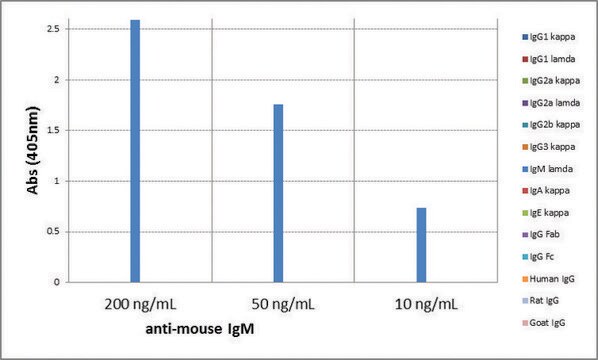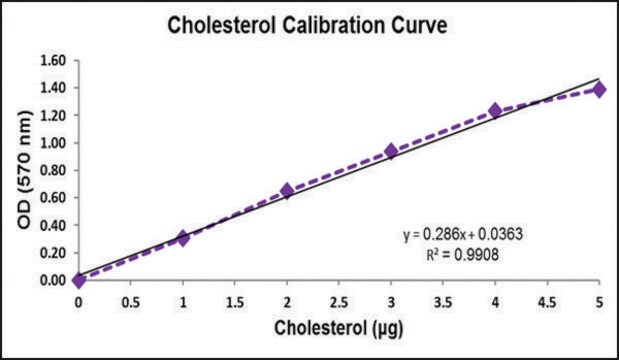MABC008
Mouse IgM Negative Control, clone GC323
Mouse IgM Negative Control Monoclonal Antibody validated for use in Flow Cytometry & Immunofluorescence.
Autenticatiper visualizzare i prezzi riservati alla tua organizzazione & contrattuali
About This Item
Codice UNSPSC:
12352203
eCl@ss:
32160702
NACRES:
NA.42
Prodotti consigliati
Origine biologica
mouse
Livello qualitativo
Clone
GC323, monoclonal
Produttore/marchio commerciale
Chemicon®
Concentrazione
0.5 mg/mL
tecniche
flow cytometry: suitable
immunofluorescence: suitable
Isotipo
IgM
Condizioni di spedizione
wet ice
modifica post-traduzionali bersaglio
unmodified
Specificità
This antibody reacts specifically with the outer membrane protein I component of various strains of Neisseria gonorrhoeae and does not react with any human cell surface component.
Immunogeno
Protein I preparation of Neisseria gonorrhoeae.
Applicazioni
Research Category
Secondary & Control Antibodies
Epitope Tags & General Use
Secondary & Control Antibodies
Epitope Tags & General Use
Research Sub Category
Isotype Control Antibodies
Isotype Control Antibodies
The use of this antibody enables an estimation of non-specific binding of mouse monoclonal antibodies of isotype IgM to cell surface components in human blood and bone marrow. It is not suitable for use in immunohistochemical procedures.
SUGGESTED USAGE
The control antibody should be diluted to the same concentration as the test antibody, and equivalent volumes used. Flow cytometry and immunofluorescence - use 10 μl direct from the vial per 100 μl of whole blood, or 1 x 10E6 peripheral blood mononuclear cells (PBMC) in 100 μl buffer.
SUGGESTED USAGE
The control antibody should be diluted to the same concentration as the test antibody, and equivalent volumes used. Flow cytometry and immunofluorescence - use 10 μl direct from the vial per 100 μl of whole blood, or 1 x 10E6 peripheral blood mononuclear cells (PBMC) in 100 μl buffer.
Stato fisico
Format: Purified
Purified from mouse ascitic fluid. The antibody is supplied in 0.5ml 25mM Tris HCl, 0.4M NaCl, pH 8.0, containing 0.2% bovine serum albumin and 0.1% sodium azide. The characteristics of each lot are tested by electrophoresis, specific immunofluorescence assay and flow cytometry.
Stoccaggio e stabilità
Store at 2 to 8°C, for up to 6 months. For prolonged periods, store below -20°C in undiluted aliquots. AVOID REPEATED FREEZE/THAW CYCLES.
WARNING: The monoclonal reagent solution contains 0.1% sodium azide as a preservative. Due to potential hazards arising from the build up of this material in pipes, spent reagent should be disposed of with liberal volumes of water.
WARNING: The monoclonal reagent solution contains 0.1% sodium azide as a preservative. Due to potential hazards arising from the build up of this material in pipes, spent reagent should be disposed of with liberal volumes of water.
Note legali
CHEMICON is a registered trademark of Merck KGaA, Darmstadt, Germany
Esclusione di responsabilità
Unless otherwise stated in our catalog or other company documentation accompanying the product(s), our products are intended for research use only and are not to be used for any other purpose, which includes but is not limited to, unauthorized commercial uses, in vitro diagnostic uses, ex vivo or in vivo therapeutic uses or any type of consumption or application to humans or animals.
Avvertenze
Warning
Indicazioni di pericolo
Consigli di prudenza
Classi di pericolo
Met. Corr. 1
Codice della classe di stoccaggio
8B - Non-combustible, corrosive hazardous materials
Classe di pericolosità dell'acqua (WGK)
WGK 2
Punto d’infiammabilità (°F)
Not applicable
Punto d’infiammabilità (°C)
Not applicable
Certificati d'analisi (COA)
Cerca il Certificati d'analisi (COA) digitando il numero di lotto/batch corrispondente. I numeri di lotto o di batch sono stampati sull'etichetta dei prodotti dopo la parola ‘Lotto’ o ‘Batch’.
Possiedi già questo prodotto?
I documenti relativi ai prodotti acquistati recentemente sono disponibili nell’Archivio dei documenti.
Acceptance of embryonic stem cells by a wide developmental range of mouse tetraploid embryos.
Lin, CJ; Amano, T; Zhang, J; Chen, YE; Tian, XC
Biology of Reproduction null
Chih-Jen Lin et al.
PloS one, 9(9), e106916-e106916 (2014-09-12)
The ability of small molecules to maintain self-renewal and to inhibit differentiation of pluripotent stem cells has been well-demonstrated. Two widely used molecules are PD 98059 (PD), an inhibitor of extracellular-signal-regulated kinase 1 (ERK), and SC1 (Pluripotin), which inhibits the
Il team dei nostri ricercatori vanta grande esperienza in tutte le aree della ricerca quali Life Science, scienza dei materiali, sintesi chimica, cromatografia, discipline analitiche, ecc..
Contatta l'Assistenza Tecnica.



